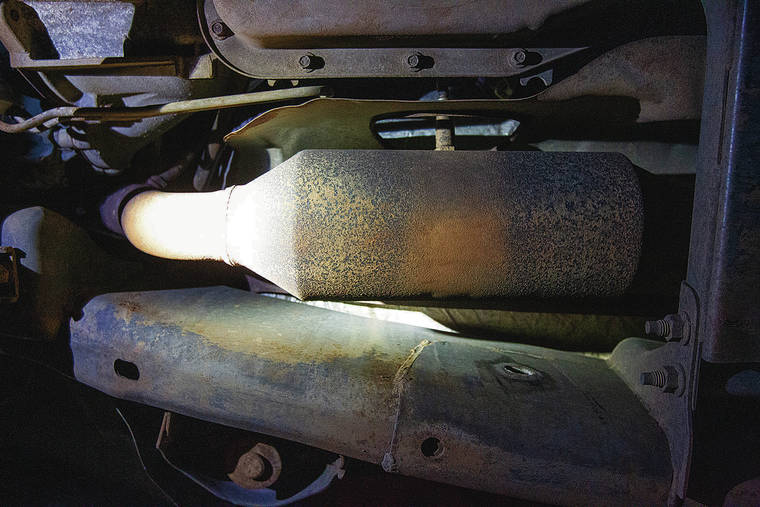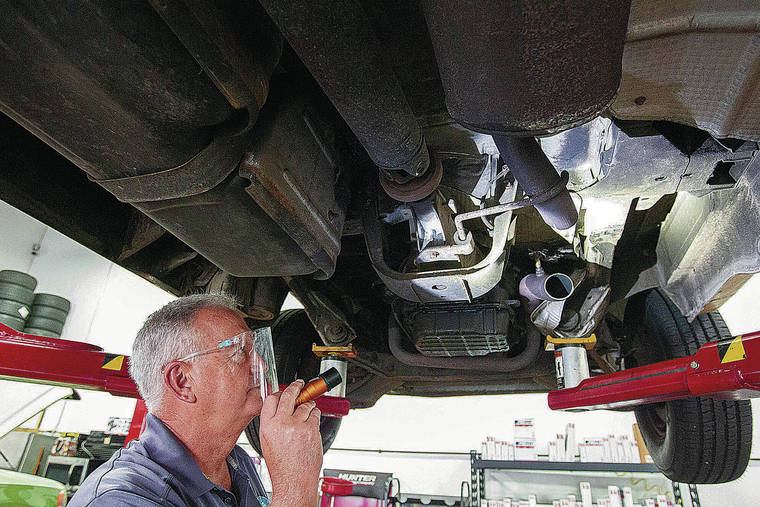Bills would make catalytic converter theft a felony in Hawaii

CINDY ELLEN RUSSELL / CRUSSELL@STARADVERTISER.COM
Pictured is an intact catalytic converter. It contains precious metals like platinum to help filter toxic gases from exhaust emissions.

CINDY ELLEN RUSSELL / CRUSSELL@STARADVERTISER.COM
Capitol Auto Services general manager Phillip Fox showed where thieves removed the catalytic converter from a Dodge van, which was undergoing repairs at the Waipio shop on Wednesday.


Increasing demand for stolen precious metals contained in vehicle catalytic converters has prompted two bills that would make thefts of catalytic converters a Class C felony and require more documentation from sellers and Hawaii scrap dealers willing to buy them.
Thefts of catalytic converters — especially from Honda Elements —have continued to rise following a 2019 Honolulu Star-Advertiser report on the phenomenon Opens in a new tab.
Catalytic converters contain precious metals such as platinum to help filter toxic gases from exhaust emissions.
Between Dec. 1, 2020, and Jan. 31, there were 289 catalytic converter thefts across Oahu, mostly in Kalihi and Kapolei, according to the office of state Rep. Jackson Sayama, (D, Palolo-St. Louis Heights-Kaimuki), who introduced House Bill 446. Opens in a new tab
Sayama said he wanted to create a new category of crime specifically for felony catalytic converter theft and create a better paper trail because of the financial burdens on families, especially during the COVID-19 Opens in a new tab pandemic.
“It’s a burden on the lifestyle,” Sayama told the Star-Advertiser. “I want to give families a sense of security and for them to not worry about their car breaking down when they already have enough to worry about in this pandemic.”
Don't miss out on what's happening!
Stay in touch with breaking news, as it happens, conveniently in your email inbox. It's FREE!
HB 446 Opens in a new tab would classify catalytic converter theft as a Class C felony. It would require sellers to provide vehicle records such as name, address, vehicle registration and driver’s license to the buyer.
The Senate is considering a companion bill, Senate Bill 55. Opens in a new tab
If the seller of a catalytic converter does not provide all of the documents, the buyer must refuse and report the attempted sale to police. Buyers who do not comply face potential fines of no less than $100 and no more than $2,000.
HB 446 is scheduled to be heard at 2 p.m. today before the House Consumer Protection and Commerce Committee.
Phillip Fox, owner of Capitol Auto Service in Waipio, has two vans in his shop waiting for catalytic converters to be replaced. One belongs to a Korean Baptist church and the other to the business next door.
In 2019, Honda Elements were a favorite target of catalytic converter thieves because of the easy access provided by the vehicle’s high clearance.
Now Fox said that thieves have “diversified their portfolio” by adding Toyota Corollas, Honda Odysseys, SUVs and others.
One car owner even had a catalytic converter stolen from outside of Fox’s shop in December after the owner had it towed in for repairs while the shop was closed.
In 2019, Fox saw at least two vehicles a week with missing catalytic converters. Now he gets five to six each week.
Catalytic converters are the easiest part to steal because they’re located at the bottom of a vehicle, according to thenewswheel.com Opens in a new tab. They typically weigh only eight to 10 pounds.
“Anybody can steal a catalytic converter within a minute or two,” Fox said. “You can lift it up with one hand.”
While a thief can sell a stolen catalytic converter for $40 to $50, Fox said replacing one can cost a vehicle owner hundreds of dollars — even with insurance.
“I feel so sorry for these people,” Fox said. “Some of them have $1,000 deductible on their insurance, and some people don’t have insurance on their cars. The average catalytic converter repair and replacement runs about $1,200 to $1,300. It’s a lot of money.”




